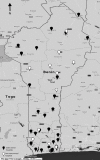'Rowing against the current': the policy process and effects of removing user fees for caesarean sections in Benin
- PMID: 29564156
- PMCID: PMC5859807
- DOI: 10.1136/bmjgh-2017-000537
'Rowing against the current': the policy process and effects of removing user fees for caesarean sections in Benin
Abstract
Background: In 2009, the Benin government introduced a user fee exemption policy for caesarean sections. We analyse this policy with regard to how the existing ideas and institutions related to user fees influenced key steps of the policy cycle and draw lessons that could inform the policy dialogue for universal health coverage in the West African region.
Methods: Following the policy stages model, we analyse the agenda setting, policy formulation and legitimation phase, and assess the implementation fidelity and policy results. We adopted an embedded case study design, using quantitative and qualitative data collected with 13 tools at the national level and in seven hospitals implementing the policy.
Results: We found that the initial political goal of the policy was not to reduce maternal mortality but to eliminate the detention in hospitals of mothers and newborns who cannot pay the user fees by exempting a comprehensive package of maternal health services. We found that the policy development process suffered from inadequate uptake of evidence and that the policy content and process were not completely in harmony with political and public health goals. The initial policy intention clashed with the neoliberal orientation of the political system, the fee recovery principles institutionalised since the Bamako Initiative and the prevailing ideas in favour of user fees. The policymakers did not take these entrenched factors into account. The resulting tension contributed to a benefit package covering only caesarean sections and to the variable implementation and effectiveness of the policy.
Conclusion: The influence of organisational culture in the decision-making processes in the health sector is often ignored but must be considered in the design and implementation of any policy aimed at achieving universal health coverage in West African countries.
Keywords: child health; health policies and all other topics; health services research; health systems; maternal health.
Conflict of interest statement
Competing interests: None declared.
Figures
References
-
- Araoyinbo ID, Ataguba JE. User fees in Africa: from theory and evidence, what next? An essay submitted to the african Health Economics and Policy Association. Alliance for Health Policy and System Research, 2008.
-
- WHO. National health account indicators, 2016.
LinkOut - more resources
Full Text Sources
Other Literature Sources


